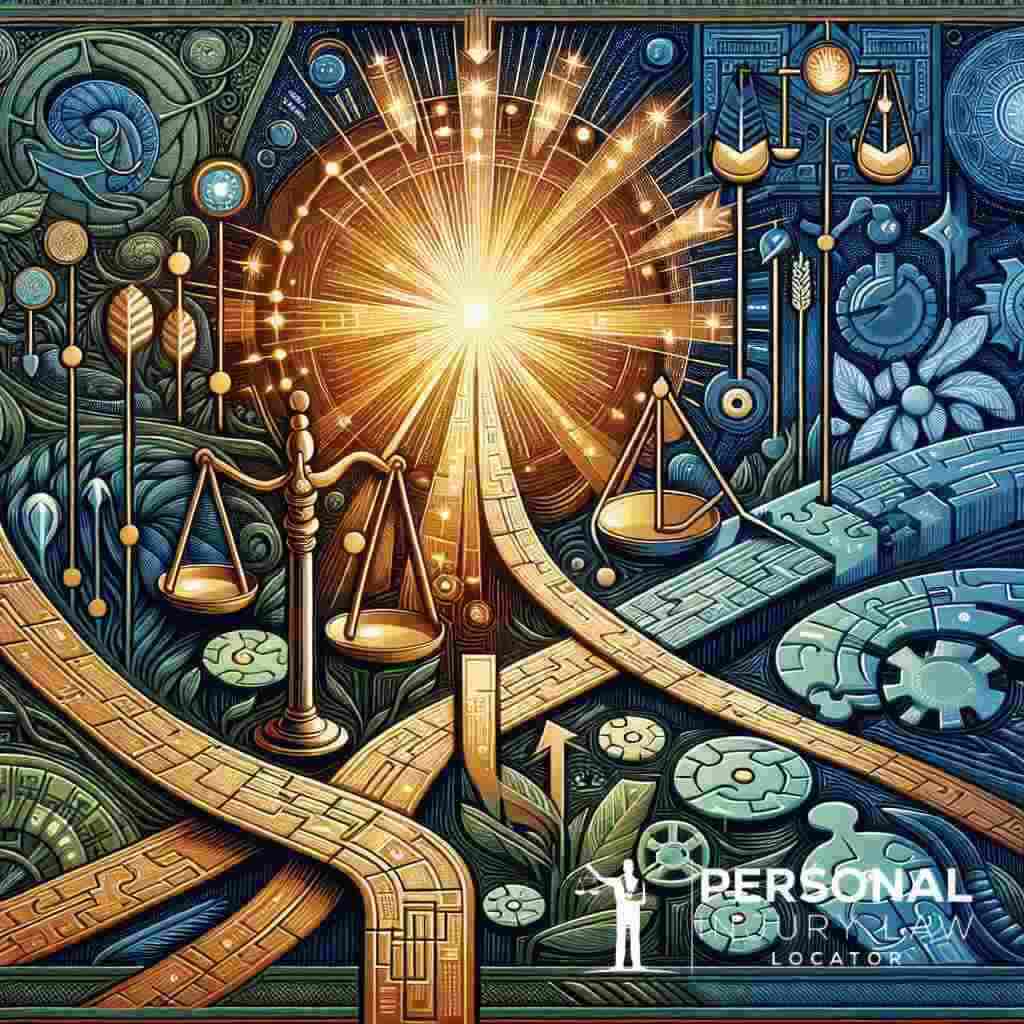 Posted On: 01/11/2025
Posted On: 01/11/2025Unveiling the Hidden Reality
Beyond Physical Injuries: Understanding Emotional Distress
Emotional distress, a pivotal yet often understated component of personal injury law, transcends the tangible confines of physical injuries. When an injured person undergoes trauma, the emotional ramifications can encompass conditions like anxiety, depression, or PTSD. These emotional injuries can be as debilitating, if not more so, than physical injuries. In many personal injury lawsuits, the recognition of emotional distress can significantly impact the overall compensation. The unseen scars necessitate the same legal attention and care, urging the need for a comprehensive understanding of emotional distress in legal claims.
The Psychological Impact of Civil Lawsuits
The psychological impact of civil lawsuits on the injured party is profound. Navigating these legal waters adds another layer of stress, manifesting as mental anguish for many injured parties. Coping with complex legal processes while simultaneously managing both physical and psychological injuries can exacerbate existing conditions. The psychological effects of civil lawsuits often heighten emotional suffering, requiring a legal team to be sensitive to the mental health aspects of their clients. It underscores the need for legal representation that acknowledges these psychological challenges and empowers the injured party towardrecovery and justice.
Emotional Distress in Legal Precedents
Historically, emotional distress has gained recognition as a cause of action in numerous landmark cases. The evolution of legal standards has paved the path for broader acceptance of emotional injury claims. Not long ago, emotional distress was considered secondary to physical injuries. However, recent legal precedents illustrate greater awareness and understanding of emotional harm’s legitimacy. Recognizing psychological harm progresses not only in the courts but also influences how insurance companies handle personal injury claims. These shifts in legal perspectives herald a new era where emotional distress is acknowledged as an integral part of any meaningful settlement or verdict in personal injury cases.
Navigating the Legal Complexities
Decoding Non-Economic Damages
Understanding non-economic damages is crucial for any legal professional handling emotional distress cases. Unlike tangible costs such as medical bills or property damage, non-economic damages cover intangible losses like mental anguish or pain and suffering damages explained here. These damages aim to compensate the injured party for emotional suffering and decreased quality of life. Courts look to assess the severity, duration, and impact of emotional injuries on the person’s life. This assessment makes it imperative for personal injury lawyers to skillfully articulate emotional and psychological harm within their legal strategy.
Non-economic damages reflect the challenge of quantifying emotional distress in personal injury lawsuits. They requireire a comprehensive understanding ofthe legal criteria used to evaluate these damages and a precise articulation of the injured party’s experience in court. However, determining an appropriate value for emotional distress demands not only legal acumen but also an understanding of the psychological underpinnings. Experienced personal injury attorneys often rely on testimonies and expert evaluations to substantiate claims, demonstrating the need for adept legal representation in these cases.
How Emotional Distress Claims Are Construed
In legal contexts, emotional distress claims are meticulously scrutinized to ascertain their validity and impact. The interpretation of these claims often hinges on demonstrative evidence, such as psychological assessments, to establish authenticity. Foundational legal elements include proving that the distress suffered is directly linked to the incident in question and that it significantly alters the quality of life. Legal intricacies demand a robust understanding of emotional distress definitions, shaping how claims are framed.
Successfully navigating emotional distress claims involves cohesively blending factual evidence with compelling personal narratives. For instance, showcasing how incidents like car accidents have led to emotional injury in injury claims can be insightful. Legal teams must ensure they implement an integrated approach, correlating evidence with impactful storytelling. This strategy helps paint a comprehensive picture for the court, highlighting the real-life implications of emotional sufferingss and the need for legal redress.
Emotional Trauma and Cause of Action
Emotional trauma is increasingly acknowledged as a legitimate cause of action in modern legal proceedings. This evolution unfurls avenues for victims to seek justice and obtain rightful compensation for their suffering. The recognition of emotional trauma transitions from an abstract concept to a well-established realm within personal injury law. Legal teams now emphasize psychological evaluations, aiming to present a clear link between emotional trauma and the triggering event.
Emotions tied to trauma, such as PTSD or anxiety, drive the urgency for specialized legal strategies. Crafting a cause of action around emotional trauma demands intricate legal maneuvering. It’s essential to capture how incidents cause severe emotional upheaval, affecting daily functioning and well-being. By partnering with skilled legal professionals from entities like Personal Injury Law Locator, individuals can find the expertise needed to advocate skillfully for their emotional distress claims, translating personal pain into courtroom acknowledgment.
The Role of Medical Professionals
Importance of Psychological Evaluation in Court
Psychological evaluation plays a crucial role in substantiating claims of emotional distress in court. When an injured person presents their case, the court requires demonstrable evidence of the psychological impact experienced. Here, psychological evaluations provide a detailed assessment, offering an objective lens into the injured party’s emotional and mental state. These evaluations help quantify the extent of mental anguish claims, painting a clearer picture for judges and juries. Proper documentation from mental health professionals ensures a well-rounded case, contributing significantly to the injured party’s pursuit of compensation for emotional harm.
Medical professionals’ expertise in psychological evaluation enhances the legal team’s ability to articulate the client’s suffering accurately. For example, such evaluations might measure the severity and duration of conditions like depression or PTSD, which often result from traumatic incidents. By providing empirical evidence of emotional distress, psychological evaluations underpin emotional distress lawsuits. This evidence becomes instrumental in court proceedings, aiming to ensure that the emotional suffering experienced by the injured person is acknowledged and appropriately compensated.
Partnering with Medical Experts for Emotional Injury Claims
Partnering with medical experts is indispensable for successfully presenting emotional injury claims. Personal injury lawyers often collaborate with psychologists and psychiatrists to strengthen the case, leveraging their insights to validate emotional distress claims. This partnership enhances the narrative presented to the court, giving a voice to the often invisible pain that emotional injuries cause. Legal teams rely on these medical experts to provide detailed reports and, if necessary, expert testimony during court proceedings.
By partnering with medical experts, injured parties are better equipped to navigate the complexities of emotional harm in personal injury lawsuits. Medical evidence offers credibility and depth to the claims, whether through psychological evaluations or insights into how emotional injuries impede daily functions. Furthermore, these partnerships often lead to significant findings that highlight the need for compensation for emotional harm, ultimately influencing the settlement outcomes favorably for the client. For those wondering where to start, consulting platforms like Personal Injury Law Locator can efficiently connect injured parties with both legal and medical professionals.
Correlating Physical Injuries with Emotional Harm
The interplay between physical injuries and emotional harm is an essential consideration in personal injury claims. Often, the trauma from a physical injury can exacerbate or even directly lead to emotional distress. Understanding this correlation is pivotal for both the legal and medical teams involved in a case. It’s crucial to demonstrate how physical injuries contribute to emotional trauma when presenting emotional distress evaluation in personal injury cases.
Medical professionals analyze how the nature and extent of physical injuries might correlate with psychological symptoms. For instance, a motor vehicle accident leading to long-term disability can result in significant emotional distress, impacting the injured party’s quality of life. By evaluating both physical and emotional injuries concurrently, attorneys are better positioned to argue for comprehensive compensation packages that address all facets of their client’s pain and suffering. Such a holistic approach ensures that clients receive the justice they deserve, factoring in both visible scars and emotional upheaval.
Quantifying the Intangible: Calculating Damages
Formulating Emotional Distress Settlements
Formulating emotional distress settlements requires a delicate balance between legal expertise and an understanding of human emotions. Each claim is unique, necessitating an individualized assessment process. In these cases, damages for emotional distress are quantified by considering factors such as the intensity and duration of the suffering. Distress-related legal settlements often involve skilled negotiation, where legal teams present compelling narratives coupled with evidence, such as psychological evaluations, to substantiate their claims. These settlements not only provide financial compensation but also acknowledge the impact of emotional injuries, thus playing a critical role in the healing process for the affected individual.
The complexity of quantifying emotional distress lies in its intangible nature, which contrasts sharply with tangible damages like medical bills. Legal professionals delve into the nuanced facets of the injured party’s emotional pain, utilizing testimonies from mental health professionals to provide a concrete foundation. This collaborative effort results in settlements that reflect the real-life impact of emotional harm, reassuring the injured party that their emotional suffering is recognized and validated within the legal framework.
Legal Guidelines for Emotional Harm
Understanding the legal guidelines for emotional harm is vital for practitioners handling these sensitive cases. These guidelines are designed to ensure consistency and fairness when awarding damages. Courts analyze factors such as the severity of the psychological impact and the causal link between the distress and the incident. With evolving legal guidelines for emotional well-being, legal teams need to stay informed about precedents set by recent rulings and adapt to changes in the well-being landscape.
Navigating these guidelines involves a comprehensive understanding of both current legislation and societal shifts in recognizing emotional trauma. By adhering to these standards, legal professionals can effectively argue for fair compensation and ensure that physical injuries do not overshadow emotional harm physical injuries do not overshadow emotional harm. As emotional distress becomes increasingly recognized in legal arenas, these guidelines provide the structural framework necessary for crafting robust cases that respect plaintiffs’ emotional realities.
Case Studies of Court-Awarded Distress Compensation
Exploring case studies of court-awarded distress compensation offers valuable insights into the judicial approach toward emotional distress claims. In many instances, decisions hinge on demonstrable proof of emotional suffering, such as psychological assessments or expert testimonies. These cases, which often result in significant awards, illustrate the judicial system’s growing recognition of emotional trauma as a legitimate claim within personal injury law.
For example, in cases where individuals suffered PTSD following a traumatic event, courts have awarded substantial damages, acknowledging the profound impact on the plaintiffs’ quality of life. Such precedents emphasize the importance of presenting a well-documented and compelling case, with an emphasis on both medical and legal perspectives. These examples set a benchmark for future claims, enhancing our understanding of how psychological trauma is perceived in legal contexts and underscoring the need for thorough preparation and expert collaboration.
Legal Representation and Emotional Wellbeing
Crafting a Strong Legal Team for Emotional Distress Cases
Building a resilient legal team is paramount in emotional distress cases. A well-rounded team cis comprisednof ot just skilled attorneys,but also medical experts adept in psychological evaluation in court cases. This collaboration ensures every facet of the emotional distress claim is meticulously scrutinized and presented. Legal teams with diverse expertise can provide a robust defense against insurance companies that often underplay emotional injuries. By leveraging specialized legal knowledge and medical insights, a strong legal team inherently improves the chances for a successful outcome in court.
A proficient legal team is attuned to the nuances of emotional distress, which aids in forming a compelling case narrative. For instance, experienced attorneys focus on developing evidence-backed claims that highlight the emotional toll on the injured party. They employ strategic legal maneuvers, including psychological assessments, demonstrating the necessity of comprehensive legal representation in emotional distress lawsuits. This approach underscores the importance of enlisting personal injury lawyers familiar with the emotional aspects of litigation.
Personal Injury Law Locator: Connecting with the Right Lawyer
Finding the right lawyer is crucial when navigating the complexities of emotional distress lawsuits. Personal Injury Law Locator simplifies this process, connecting individuals with proficient attorneys tailored to their needs. As a service available across all 50 states, it offers a network of experts specializing in emotional distress cases, ensuring clients receive the best possible legal support. This platform matches clients with lawyers experienced in crafting strategies to secure optimal settlements, particularly in delicate emotional harm situations.
Through Personal Injury Law Locator, clients can access attorneys who understand the intricacies involved in emotional distress claims, enhancing their legal journey. The platform streamlines the search process, enabling individuals to focus on recovery while their legal affairs are being expertly managed. By offering connections to lawyers well-versed in emotional injury claims, the service plays a pivotal role in bridging the gap between legal expertise and client needs.
Ensuring Emotional Well-Being Through Legal Processes
Securing legal representation is a foundational step toward ensuring emotional well-being during the legal process. Attorneys well-versed in emotional distress cases not only provide legal guidance but also alleviate the stress associated with litigation. Legal teams focus on empathetic and personalized services, recognizing the profound impact such cases have on mental health. This approach assures clients that their emotional well-being is a priority throughout the entire legal process.
Legal professionals aim to minimize additional stressors by managing complex legal tasks, thus enabling clients to concentrate on healing. A well-structured legal approach, informed by precedent and guided by compassion, assures clients that their emotional suffering is acknowledged within the legal framework. By supporting clients both legally and emotionally, lawyers ensure that the pursuit of justice does not come at the expense of mental health.
For those seeking assistance, platforms like Personal Injury Law Locator facilitate access to experts dedicated to protecting legal rights and emotional well-being. This comprehensive support structure is integral in navigating the emotional challenges inherent in lawsuits, underscoring the importance of partnering with legal professionals committed to holistic client care.
Conclusion: The Essential Pursuit of Justice
Evolving Legal Standards: A Mental Health Perspective
The evolving legal standards regarding emotional distress underscore the increasing recognition of mental health considerations within the judicial system. As the prevalence of emotional trauma claims grows, courts are adapting by refining their approach to evaluating these claims. This shift reflects a broader societal acknowledgment of the importance of mental health, influencing how legal professionals navigate the complexities of emotional distress cases. Legal bodies are crafting more nuanced definitions and standards to accurately assess mental injuries, ensuring that victims receive the justice they deserve. Legal experts are now equipped to present cases that align with contemporary understandings of psychological harm, offering more robust psychological trauma in legal contexts. This ongoing evolution is pivotal in bridging the gap between emerging psychological paradigms and legal restitution.
Paving the Path for Emotional Distress Recognition
Judicial systems are increasingly paving the path toward greater recognition of emotional distress, fostering environments where these claims can thrive. Through partnering with legal experts for emotional claims, individuals are better supported in presenting intricate emotional narratives in court. The alignment of legal practices with psychological realities highlights a commitment to holistic justice. With enhanced protocols and an informed understanding of psychological impacts, the recognition of emotional distress doesn’t just stop at acknowledgment but strives to offer meaningful reparations for affected individuals. The trajectory towards recognizing emotional harm indicates a legal landscape that values mental suffering on par with physical injuries. Empowering victims through validated recognition, these advancements champion rights that encapsulate the entirety of a person’s emotional and physical well-being.
The Future of Emotional Injury Claims
The future of emotional injury claims shines brightly with promise, driven by ongoing advancements and heightened societal awareness. As awareness grows, so too does the refinement of legal avenues designed to address emotional distress. These changes herald a new era where emotional injuries are treated with the seriousness they warrant. Continuing advancements in psychological research and legal practice ensure that emotional distress claims will become more streamlined and compelling, serving justice to those affected by traumatic events. Through dedicated institutions like Personal Injury Law Locator, individuals are directed to knowledgeable attorneys who adeptly navigate the complexities of these claims, securing equitable compensation. As legal frameworks continue to evolve, the commitment to recognizing and remedying emotional distress fortifies a future wherein victims receive comprehensive acknowledgment and justice for their suffering.
Frequently Asked Questions
Question: How does Personal Injury Law Locator help with emotional distress lawsuits?
Answer: Personal Injury Law Locator connects individuals with expert personal injury lawyers who specialize in emotional distress lawsuits. Our network of attorneys understands the intricacies of psychological impacts, such as anxiety or PTSD, and they are skilled at articulating emotional injury within legal strategies. By partnering with medical professionals, these lawyers substantiate claims with detailed psychological evaluations, ensuring that both mental suffering and physical injuries are comprehensively addressed in court. Trusting Personal Injury Law Locator guarantees you access to knowledgeable attorneys who secure optimal settlements for emotional distress claims.
Question: In the blog titled What is the Impact of Emotional Distress in Lawsuits?, how does Personal Injury Law Locator support clients through the legal complexities?
Answer: As highlighted in the blog What is the Impact of Emotional Distress in Lawsuits?, Personal Injury Law Locator assists clients by connecting them with attorneys experienced in handling both the psychological and legal aspects of these complex cases. These attorneys are adept at navigating the nuances of emotional injury, employing strategic legal maneuvers and expert testimonies to present a compelling case. By relying on our services, clients can focus on recovery while we streamline the search for proficient legal representation, ensuring their emotional distress is acknowledged and compensated.
Question: How do Personal Injury Law Locator services ensure compensation for emotional trauma claims?
Answer: Personal Injury Law Locator ensures compensation for emotional trauma claims by matching clients with experienced attorneys who proficiently navigate the intricacies of emotional distress law. These lawyers collaborate with medical experts to gather compelling evidence, such as psychological evaluations, which underpin emotional injury claims. By presenting robust narratives in court, these legal professionals ensure that the psychological harm endured by clients is recognized and compensated fairly, addressing the emotional well-being in lawsuits.
Question: What role do medical professionals play in emotional injury cases facilitated by Pthe ersonal Injury Law Locator?
Answer: Medical professionals are indispensable in emotional injury cases facilitated by the Personal Injury Law Locator. They collaborate with personal injury lawyers to provide detailed psychological assessments, which are crucial in substantiating claims of emotional distress. This partnership ensures that mental anguish claims are backed by empirical evidence, enabling a comprehensive presentation of the client’s psychological impact in court. By working with top medical experts, Personal Injury Law Locator ensures that emotional injuries are given the attention they deserve, ultimately influencing settlements positively.
Question: How does Personal Injury Law Locator align legal strategies with evolving standards on emotional harm?
Answer: Personal Injury Law Locator aligns legal strategies with evolving standards on emotional harm by staying informed about the latest legal guidelines and court precedents related to emotional distress. Our network of attorneys is well-versed in the dynamic landscape of mental health-related legal standards, enabling them to craft legal strategies that resonate with contemporary understandings of psychological harm. This approach ensures that emotional injuries receive the serious consideration they warrant, leading to fair compensation and justice for affected individuals.




